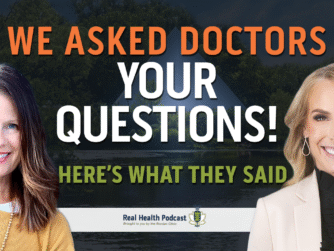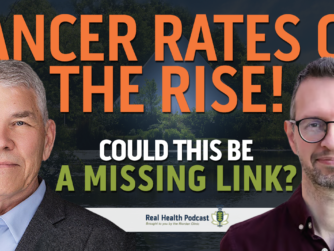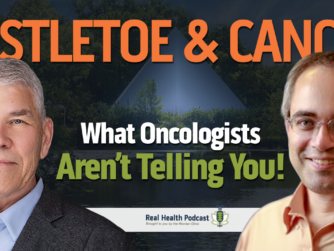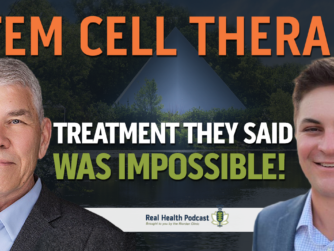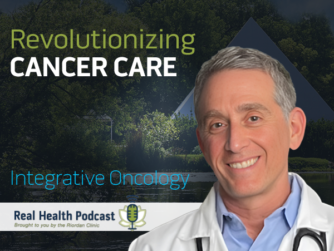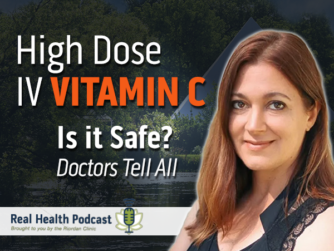In this episode, Dr. Ron and Kim Romig talk about new safety concerns around glyphosate, AKA Roundup. Glyphosate is a weed killer used as house hold item as well as a staple product with many farmers, but may be causing some major issues when it comes to your health.
Thank You To This Episode’s Sponsor
Episode Transcripts
Disclaimer: The information contained on the Real Health Podcast. And the resources mentioned are for educational purposes only. They are not intended as, and shall not be understood or construed as medical or health advice. The information contained on this podcast is not a substitute for medical or health advice from a professional who is aware of the facts and circumstances of your individual situation. Information provided by hosts and guests on the Real Health Podcast or the use of any products or services mentioned does not create a practitioner patient relationship between you and any persons affiliated with this podcast.
Intro: This is the Real Health Podcast brought to you by Riordan Clinic. Our mission is to bring you the latest information and top experts in functional and integrative medicine to help you make informed decisions on your path to real health.
Kim Romig: Welcome to the Real health podcast at the Riordan clinic. I’m your host today, Kim Romig and joining me today is Dr. Ron, our chief medical officer here at the Riordan Clinic. Welcome
Dr. Ron: Kim. Welcome to you. Glad to have you aboard now.
Kim Romig: Yes, it’s definitely a new journey for sure.
Dr. Ron: Yeah.
Kim Romig: All right. So today we are talking about new safety concerns about an old weed killer glyphosate, which is also known as Roundup. Can you tell me more about that?
Dr. Ron: Sure. Yeah, so you know I think most people have heard about Roundup. Probably most people have used it. People use it on their lawns. They can use it, you know, to clear out weeds from between the crevices of their sidewalks and driveways. Of course the farmers make very extensive use of it. It’s been in use since 1974. So it’s been around a long time and, and we’ve been told that it is safe. There’s a couple things that I have found out about it that make me a little concerned and I’ll come back to this, but it’s also when it first was developed it, the, the application was for it as an antibiotic and most people don’t know that.
Kim Romig: oh, wow.
Dr. Ron: Which means that it can as any antibiotic kill bacteria. So some of the new concerns are surrounding the fact that if there are glyphosate residues in our food and we eat that food, we are putting an antibiotic in our gut, which, you know, people can do. It’s not, it itself is not going to kill you. But what could happen is that when you change the composition of your gut bacteria, an unfavorable way, it can cause leaky gut irritable bowel, and that can lead to autoimmune disorders. So that’s, that’s a concern right there. It’s not the major concern right now, but it’s a big concern.
Kim Romig: Okay. Yeah. So, so how does it work? You said it was bacteria, but like
Dr. Ron: That’s one mechanism is that it, and that’s not really how it kills weeds. So most people have heard of the concept of GMO, you know, genetically modified organisms. Well, that came about because when the, when Monsanto was able to genetically change corn and soy such that the, the mechanism of glyphosate would not harm them, it would kill the weeds around them, but it wouldn’t kill them. And so by the way, the, the way it does work is that it’s very similar to an amino acid called glycine, which is in most of our proteins. And it will substitute itself into an enzyme called, an enzyme pathway called the shikimate pathway and it will no longer work. And the shipment pathway is if it affects broadleaf green plants. And so that’s why it works against you know, most of your weeds, but the reason it doesn’t kill the corn and the soy is because they’ve been genetically modified to resist it, but the bacteria in humans cannot resist it. And so even though it’s been normally portrayed as safe for humans at the low dose that it’s used at we now know it can affect the gut. And there’s also some new evidence that there are factors along with it scientific American came out with an article not too long ago, that there are there’s an, an inert ingredient called POEA that may affect human embryos, placenta and umbilical cord cells. So this may be an issue for a pregnant women.
Kim Romig: Okay. So it’s making it like causing a lot larger concern just outside of, you know, the food itself is actually in long-term being an issue causing chronic illness, gut health, things like that.
Dr. Ron: That’s right. That’s exactly right. And now it’s gotten to the point where there is concerns that it might even be related to a Hodgkin’s disease. And there was a big award Non-Hodgkin’s lymphoma is what I’m talking about. And there was a big award against Monsanto, just recently $295 million award. And now there are more people that are coming forward with concerns about it. And the, and the world health organization has listed as a as a possible carcinogen. And so, and maybe even probable. So all these things are starting to show up in the news and, you know, people say, well, that’s okay. You know, I don’t eat corn and soy anymore. I R I don’t, you know, use GMO foods. And so I only use non GMO foods, right? Like wheat, and there’s various other crops that are non-GMO. The problem is wheat and oats are also sprayed with Roundup as they get close to harvest. And the reason for that is that Roundup has been found to be a desiccating agent, which means it dries out the wheat. It also is because it kills the end growth of the wheat. It makes all the wheat kind of mature at the same time. And so, so it’s dried out it’s evenly matured. The, the farmers like that. So not every farmer sprays their wheat fields or their oat fields with, with Roundup, but a lot do. And so in doing sample testing, it was found that like 45 out of 49 oat products, for instance had residual glyphosate in it. And so things like Cheerios, things like you know, the oatmeal old-fashioned oatmeal, a lot of the breakfast bars and snack bars that kids eat are very high.
Dr. Ron: And this now I my concern, my biggest concern is that, you know, we, we here at the Riordan clinic, we do work a lot with cancer patients. We, we do integrative oncology. Dr. Tims in Overland park, Kansas city he’s been routinely measuring glyphosate levels on his cancer patients, and commonly finds it high. I happened to see a 12 year old girl who’s, she doesn’t live on a farm, she’s got sarcoma, she’s undergoing chemotherapy. And so I thought I better check her glyphosate level. And it was the upper limit should be less than one. And hers was six, which is a very much into the red zone. Did this cause her cancer? I don’t know it, what we’re, what we’re using these days is a something called terrain based integrative care of cancer patients, which we look at their metabolism. We look at toxicities, we look at stressors of a numb gut flora, a number of different factors that can play a role in whether or not the cancer progresses faster or more aggressively than, than it otherwise would. And we’re trying to limit those as best we can. So, so this is when this whole glyphosate issue kind of came to a head for me and why I think people should be aware of it. And you know, I’m not saying that everyone needs to go out and have their levels checked, but we’ve, we have had patients coming in now requesting that this be done. And, and then one of the big things they want to know is okay, if I do have an elevated glyphosate level, what do I do?
Advertisement: There’s a lot more to this conversation and it’s coming up right after a quick break today’s episode of the real health podcast is brought to you by the Riordan clinic nutrient store. The nutrient store is your resource for the highest quality nutritional supplements. Every supplement in the store is handpicked by the expert medical staff at Riordan clinic, providing you with the best quality purity, consistency, and effective dosing available. Visit store dot Riordan clinic.org to shop online.
Kim Romig: So what are those next steps?
Dr. Ron: Yes. So first of all, the first big step is become aware of where it’s going to be. Now, one thing to keep in mind is that the major use of glyphosate is with soy and corn crops. Okay. And you might say, oh, good. Well, I don’t use that much soy or corn. Do you like beef though? Because a lot of our feedlots, that’s the main food that cows are eating now. And, and also other barnyard animals, even fish on the fish farms, they’re being fed soy and corn. These have been doused in glyphosate. And so it’s getting into the meat. And so there’s a new saying, now you are what you eat ate. So this is a good indication for you to be thinking of, maybe I’ll spend a little extra money and get some grass fed beef, or maybe I’ll check the labels and not use a farm growing fish. Maybe the ocean fish would be a better choice in the lower risk. So that’s one, one way that it may show up in our diet is that way obviously the, the cereals you know certainly when you think about getting a non-GMO cereals you might want to try to buy, again, it costs a little bit more to get organic, even though because more and more people are buying organic, you’re finding it at a lower price that Walmart and Dillions in different places. So it doesn’t, it’s not necessarily huge additional expense, but it may be worth it in terms of reducing your future medical bills and that peace of mind that, you know, you’re making better dietary choices. So, so those are probably the main things is to think in terms of your diet. So that’s preventive medicine.
Kim Romig: So, I mean, if you do find out you have a high glyphosate level, is there ways to detox it? And how can we do that?
Dr. Ron: Okay, very good question. So this gets back to the mechanism for how it works. It’s substitutes for glycine and glycine is an amino acid. It’s a very important, good amino acid has a calming effect. But one interesting thing is it comes in a granular form and it’s kind of sweet. And so a different authorities have suggested using glycine crystals as an alternative to sugar. So you’re going to get two good things at the same time, kill two birds with the same stone. You’re going to basically sweeten your lemonade or your lemon juice with this. Or you can put it on food. And what it will do is it will kind of push out the glyphosate and it’ll more of the natural use of glycine will be made by our gut, our gut flora. So that’s, that’s probably the best way to approach it. You can also do detoxification, like liver detoxification, once or twice a year. There are a number of detoxification strategies. We can help people with that here at the Riordan clinic even periodically just maybe doing a little intermittent fasting and things like that. It kind of triggers the body to detox. And then there are specific liver detox strategies that can also be used.
Kim Romig: When you say intermittent fasting, is that like 16 hours of nothing, nine hours on, what does that kind of look like in detail?
Dr. Ron: Well, you know, it, it turns out we all intermittent fast when we go to bed at night and not get up in the middle of the night and eat. Now here, if you’re, if you’re midnight snacking all the time, you’re not intermittent fasting, but normally most people go about 10 to 12 hours between supper and breakfast. And so intermittent fasting is just a lengthening that you can either eat your supper earlier or your breakfast later. And as people get more used to it, they can go 14 hours, 16 hours, and just contain their eating within a 8 to 10 hour period each day. And that fasting triggers a lot of detox mechanisms in the body. It also helps you become less. What’s called insulin resistant, and that’s another major problem because our society is dealing with when you’re insulin resistant, you’re more likely to store your calories as fat. Whereas if you’re, if your insulin is still working very well, your mitochondria, which burn calories, they’re going to burn fat rather than store it. And so intermittent fasting is a good way to lose weight, to feel better, to have more energy, more brain power. And at the same time you you’re promoting better detoxification of your cells, including liver and other cells that might be holding on to glyphosate
Kim Romig: Definitely makes sense. That’s awesome.
Dr. Ron: Yeah, no. So I think just the final word here is that we do not live in a perfect world. There are all kinds of toxins out. It turns out that glyphosates probably the most common weed killer in the country. So that’s one that we’re kind of drawing people’s attention to, but there are other toxins as well. They’re lurking underneath your sink or they’re out in the garage or out in the work shed. You know, so our garden, garden supplies, those kinds of things. And so we just encourage people to have a greater awareness and look for more natural alternatives and to do you know, the various nutrients that you can use that support liver detoxification. These are things that can be done. So in general, health is a matter of awareness and making better choices. And this is just one example where I don’t think it’s going to suddenly go off the market and there, you know, there’s, it’s going to still be a problem. So we, as consumers have to be more aware and we have to vote with our pocketbooks, you know, as we continue to use more organic foods, they are more readily available and less expensive. And, and so this is a good way to gradually make changes in a positive way, as well as protecting your health and your family’s health.
Kim Romig: That’s perfect. And just taking it a by a step-by-step basis, it doesn’t need to be an over overhaul all at once, but to the next time you think about it, they’re buying whatever you need, just, you know, picking the organic option or the safer option, and really paying attention to it
Dr. Ron: Right. And the one thing I forgot to say was sweating. You know, when you exercise and sweat, or if you have a sauna or can have access to a sauna, you can sweat some of these toxins out as well. But, but overall, I kind of tell people, otherwise don’t sweat it because you can just get yourself all worked up like, oh my gosh, the world’s falling apart. Some days it seems like that, but through better choices, better education and you know, a better sense of self care. I think we can all live longer, healthier lives.
Kim Romig: Awesome. Well, thank you, Dr. Ron.
Dr. Ron: Thank you, Kim.
Outro: Thank you for listening to The Real Health podcast. If you enjoyed this episode, be sure to subscribe and leave us a review. You can also find all of the episodes and show notes over at realhealthpodcast.org. Also, be sure to visit Riordanclinic.org, where you’ll find hundreds of videos and articles to help you create your own version of real health.


